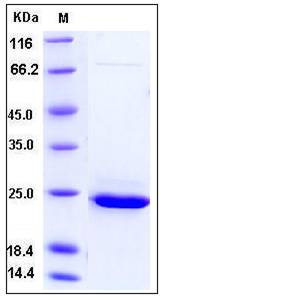Human Peroxiredoxin 1 / PRDX1 Protein (His Tag)
MSP23,NKEF-A,NKEFA,PAG,PAGA,PAGB,PRX1,PRXI,TDPX2
- 100ug (NPP4165) Please inquiry
| Catalog Number | P11194-H08E |
|---|---|
| Organism Species | Human |
| Host | E. coli |
| Synonyms | MSP23,NKEF-A,NKEFA,PAG,PAGA,PAGB,PRX1,PRXI,TDPX2 |
| Molecular Weight | The recombinant human PRDX1 comprises 205 amino acids and has a predicted molecular mass of 22.9 kDa as estimated in SDS-PAGE under reducing conditions. |
| predicted N | Met 1 |
| SDS-PAGE |  |
| Purity | > 97 % as determined by SDS-PAGE |
| Protein Construction | A DNA sequence encoding the human PRDX1 (NP_002565.1) (Met 1-Lys 199) was expressed, with a polyhistidine tag at the C-terminus. |
| Bio-activity | |
| Research Area | Signaling |Signal Transduction |Metabolism |Pathways and Processes |Metabolism processes |Apoptosis | |
| Formulation | Lyophilized from sterile PBS, 10% glycerol, 0.1mM DTT, pH 7.5 1. Normally 5 % - 8 % trehalose, mannitol and 0.01% Tween80 are added as protectants before lyophilization. Specific concentrations are included in the hardcopy of COA. |
| Background | Peroxiredoxin-1, also known as Thioredoxin peroxidase 2, Natural killer cell-enhancing factor A, PRDX1, and PAGA, is a member of the ahpC/TSA family. Peroxiredoxin-1 is constitutively expressed in most human cells. It is induced to higher levels upon serum stimulation in untransformed and transformed cells. Peroxiredoxins (PRDXs) are a family of antioxidant enzymes that are also known as scavengers of peroxide in mammalian cells. The overexpression of Peroxiredoxin-1, which is one of the peroxiredoxins that is a ubiquitously expressed protein, was related to a poor prognosis in several types of human cancers. Peroxiredoxin-1 is involved in redox regulation of the cell. It reduces peroxides with reducing equivalents provided through the thioredoxin system but not from glutaredoxin and may play an important role in eliminating peroxides generated during metabolism. Peroxiredoxin-1 Might participate in the signaling cascades of growth factors and tumor necrosis factor-alpha by regulating the intracellular concentrations of H2O2. The reduced Peroxiredoxin-1 expression is an important factor in esophageal squamous cancer progression and could serve as a useful prognostic marker. |
| Reference |
